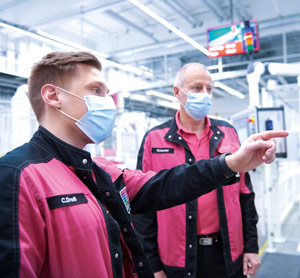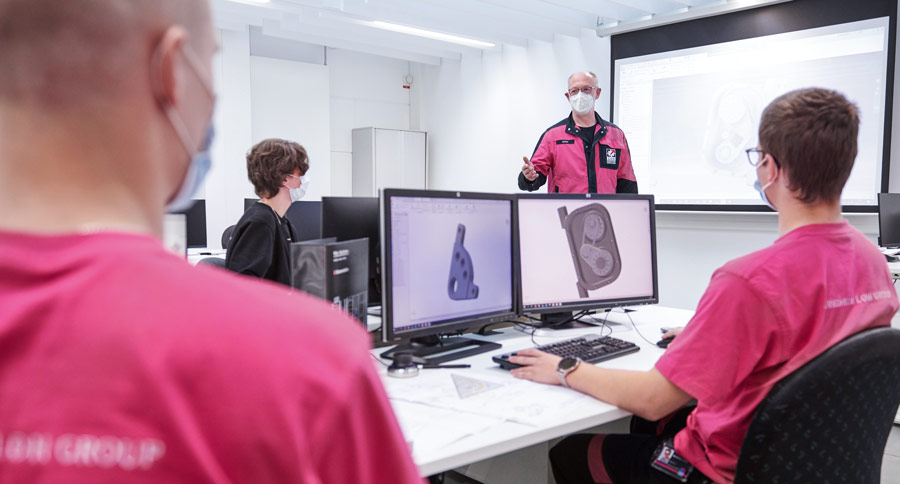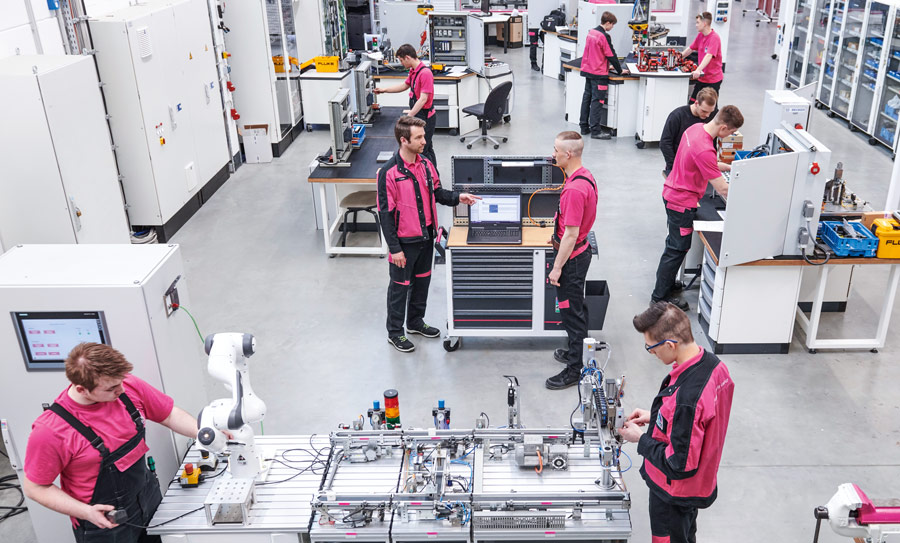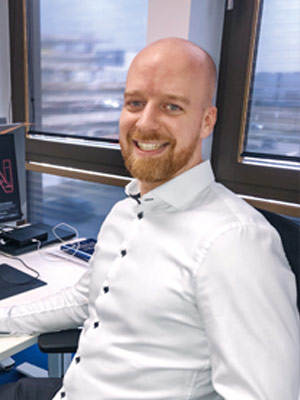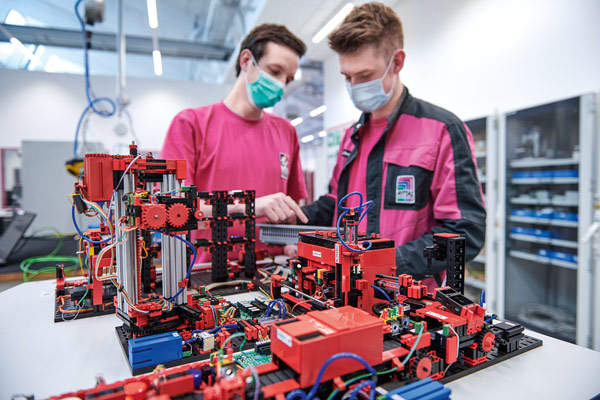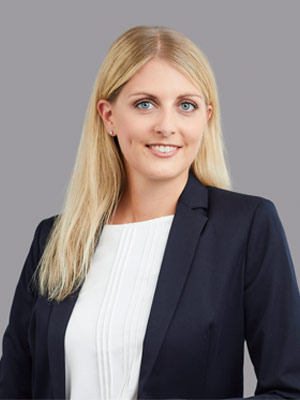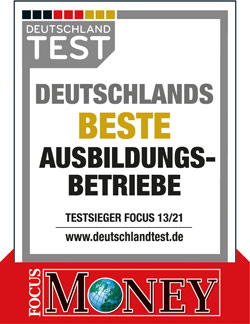Text Michael Siedenhans ––– Photography
On a visit to the new Friedhelm Loh Group (FLG) training centre, Christian Dross is awestruck. “That’s so cool!” he says. The centre is just a stone’s throw from the new Rittal plant in Haiger, where Dross now works as a production controller. His former Head of Training, Matthias Hecker, is showing him round the large, elongated main room in what used to be Hall 15. Dross started his electrician’s apprenticeship at Rittal in 2012. Back then, he was based in Wissenbach. A distance of 12 kilometres separates the old training centre from the new one in Haiger, but the two are worlds apart in terms of equipment and scope. FLG owner Professor Friedhelm Loh has invested 1.3 million euros in training new blood here.
SEEING AND LEARNING ABOUT INDUSTRY 4.0
That’s immediately apparent. An ABB robot and a collaborative robot – cobot for short (pictured on top) – that works in tandem with humans are among the highlights of the cutting-edge machine park. In the CAD/IT classrooms, training staff use whiteboards to explain, for example, how a programmable logic controller works. There’s also a 3D printer for producing small components. “Our training centre is a cornerstone for digital learning throughout the entire Group. It’s a learning system that includes various areas of production – from the assembly line, lean production, logistics and quality assurance to robot training,” explains Hecker. “As a result, apprentices see and learn about the interaction of humans, machines and digital processes based on Industry 4.0 – now and in the future,” he adds. Jakob Schönauer (19) is a big fan of this approach. “I like being here because the conditions are excellent, the training team is brilliant and the proximity to the plant means we gain a great deal of insight into high-tech manufacturing,” says the aspiring mechatronics engineer.
Right next door, at one of the world’s most state-of-the-art production plants for small and compact enclosures, specialists use their expertise to ensure the robots work properly and are supplied with materials by autonomous guided vehicles. This is the reality of Industry 4.0, which is gathering pace thanks to digitalization and has also resulted in an extremely rapid change to the training content. “Today’s training is interdisciplinary and holistic, because digitalization is creating new ways of working. Machine operators now no longer need to set up and control equipment themselves. Their main tasks are monitoring and performing checks, which requires very different knowledge from a few years ago,” says Hecker.
THE WORLD OF TRAINING
At the new centre, 40 young men and women are currently undergoing technical training. They aren’t the only ones at the company who are working towards becoming the specialists and decision- makers of the future. Over the past five years alone, around 300 individuals have learned a trade at the Friedhelm Loh Group. A total of 18 different commercial, technical and IT professions are available – and that’s just a small part of the Group’s extensive training portfolio. Committed, ambitious trainees with a basic school leaving certificate can use the “LehrePlus” (Apprenticeship Plus) scheme to obtain their university entrance qualification, while school leavers with an “Abitur”-level qualification can complete a dual work/ study programme to obtain a bachelor’s degree and university graduates can embark on a trainee programme to obtain initial professional experience in sales, consulting or research and development. A total of 230 young trainees are currently taking advantage of the various options as a springboard to a career at the company.
HOME SINCE HIS TRAINING DAYS
Felix Klehmet has already benefited from this opportunity. His parents had totally different plans for him when he was taking his final school exams 12 years ago. They thought he should continue his studies, but he didn’t want to – at least not immediately. “After leaving school, I wanted to do something practical rather than returning to the classroom,” he explains. Klehmet applied to Eplan for an apprenticeship as a wholesaler and retailer. Once he had completed his training, the HR department offered him the chance to study while continuing his career. “It was a great opportunity because I was keen to remain at the company and further my education,” says Klehmet. His wish was soon granted. In the 2012 winter semester, he started attending the RFH University of Applied Science in Cologne two evenings a week and on Saturdays to study for a bachelor’s degree in business administration. It was a stressful time, but it was well worth the effort. The former apprentice is now Head of Operational Services. At 32, he is the youngest head of department at Eplan. He is responsible for all facility management operations at the German sites of Eplan (8) and Cideon (8), and also at their international sites in 25 other countries. Klehmet is additionally in charge of the entire Eplan vehicle fleet and its central warehouse. What made all this possible? “The company has always given me the freedom to push myself and the timing has always been perfect. The right offer has always come along at the ideal time. My decision to remain at the company was spot-on. I feel very much at home here,” he says.
WINNING OVER GENERATION Z
One key objective of the entire training programme is getting apprentices to remain with the company by offering them prospects for a successful professional future. Recruiting young apprentices isn’t all that easy, though. Tina Pfeiffer-Busch, who is in charge of commercial training, is making increasing use of digital platforms, channels and formats. “The coronavirus pandemic has made it virtually impossible to get to know potential applicants in person. Job and career fairs are currently only taking place online,” she explains.
Anke Wojtynowski-Scharf, a member of the HR development team for junior staff, also misses having face-to-face contact. Before the pandemic hit, she used to go to high schools to promote the dual study programme at FLG, which gave her an insight into what schoolchildren expect of their future employers. “Generation Z considers good support to be important and favours a participative approach to work,” says the HR expert. The company has responded to this. For the duration of their studies, dual programme students are allocated a mentor for their personal development, along with a coordinator who plans the best possible projects in Germany and other countries with them. Even after completing their studies, graduates still benefit from optimum support thanks to a two-year cross-mentoring programme.
COMMUNICATING WITH RESPECT
Hecker and Pfeiffer-Busch have both noticed that the current generation of trainees is different from the previous one, which has consequences when it comes to communication at the company and the content of training. “They ask questions and expect rapid answers,” explains Pfeiffer-Busch. “Trainers and trainees now communicate with each other on an equal footing and always show each other great respect,” emphasises Hecker. “That’s how we get across to each and every young apprentice how important they are to us,” he says. This is vital because, ideally, they will remain at the company after completing their training. According to Hecker, this works to the benefit of the Friedhelm Loh Group and customers alike. “The longer staff work for us, the more familiar they are with the upstream and downstream systems and processes that are now required to develop, manufacture and roll out a product – and the customer sees that,” he emphasises.
OPPORTUNITIES OF A DIGITAL WORLD
Commercial training has changed, too. Pfeiffer-Busch explains why: “In a digital world, commercial staff not only require good digital skills, but also need to be open to anything, because having a commercial mentality and the relevant expertise is now a must in many areas,” she says. As a result, commercial apprentices are given all-round training. They work in controlling or quality management and also learn about Industry 4.0 in production. “That means young commercial staff can be deployed in a wider range of areas, which opens up even more opportunities for them in a digital world,“ continues Pfeiffer-Busch, explaining the advantage of this approach.
LEARNING FROM OTHER TEAM MEMBERS
Getting to know the different areas and staff at the company has another benefit for apprentices. “They learn how to interact with colleagues and also feel they are part of a big team in which they can work independently,” says Eplan HR Officer Amelie Ribbing. A particular point is made of encouraging this team spirit during the Trainee Days at the former Gnadenthal monastery – a training and meeting venue with a difference, where the apprentices from a particular year get to know each other and learn from one another. During the two-day workshop, the interdisciplinary groups are given a projectrelated task set by company owner Professor Friedhelm Loh. At the end of the year, he also presents awards to the winners of the competition, which calls for and encourages knowledge transfer.
TRAINING IN THE USA
Let’s now turn to training at the international sites of the companies in the Friedhelm Loh Group. In the USA, for example, professional training is normally academic, that is to say theory-based, and mostly takes place at a community college. “We’re delighted that the training of young Americans at the Rittal site in Urbana, Ohio, will now include theory, practice and interdisciplinary learning,” says Quality Engineer Dan Yohey. Last year, he and his colleague Nick Frost created three formal apprenticeship programmes that combine theory and practice based on the American system. This takes the form of a scholarship for students, who complete a series of work placements at the Rittal plant in Urbana while studying at college.
The project receives financial support from the state of Ohio. It is aimed at students of industrial engineering, controls and manufacturing engineering and maintenance technologies. The cooperation partners are Clark State College, Edison State College and the University of Dayton. Four students are currently participating in the programme. “And they’re excited about the opportunity to put the theory they learn into practice while also obtaining lots of practical knowledge with us,” continues Yohey. He describes the approach as a classic win-win situation, because the Urbana site also benefits from the trainees. “The four students have already more than met our expectations.
We’re hoping that once the programme is over, these highly- trained professionals will remain with us,” he says. While at the company, the students obtain guidance, support and advice from their own personal mentor. Frost and Yohey have selected ten members of staff for this purpose. That means they have six more scholarship places, which they are hoping to fill this year – despite the pandemic. The terms are certainly very attractive, with Rittal paying all tuition fees until the apprenticeship program ist completed. What is its motivation for doing so? “The reason we pay so much attention to the working students is that the retention rates of employees who complete these types of programme are extremely high,” reveals Yohey.
TRUE DEDICATION TO STUDENTS
Hecker’s experiences are the same as those of his American colleague. “You need to do absolutely everything you can to look after your apprentices from the second they sign the training contract,” he insists. The Friedhelm Loh Group does exactly that. Even before their training starts, the young men and women are invited to company events, sent Christmas greetings, and congratulated on their birthday and graduation. “In this way, we show the young recruits that they belong to the team from the outset and we value them highly,” says Hecker. He underlines that everything has to be right. Otherwise, it’s difficult to hold onto junior staff and ensure their long-term loyalty to the company. “A great deal of passion and dedication is required,” concludes Hecker.
